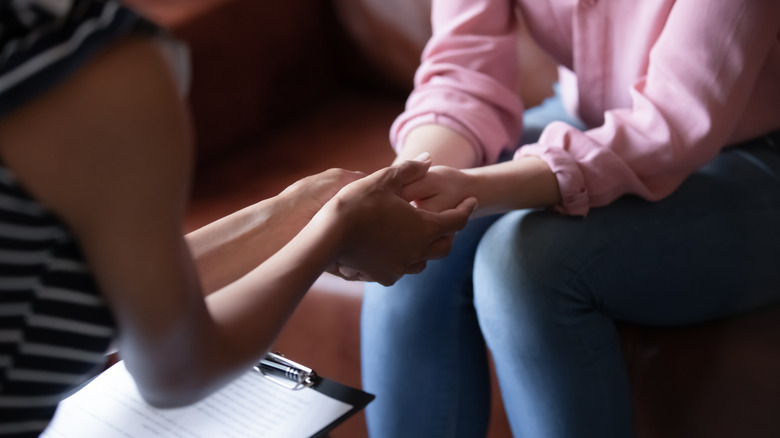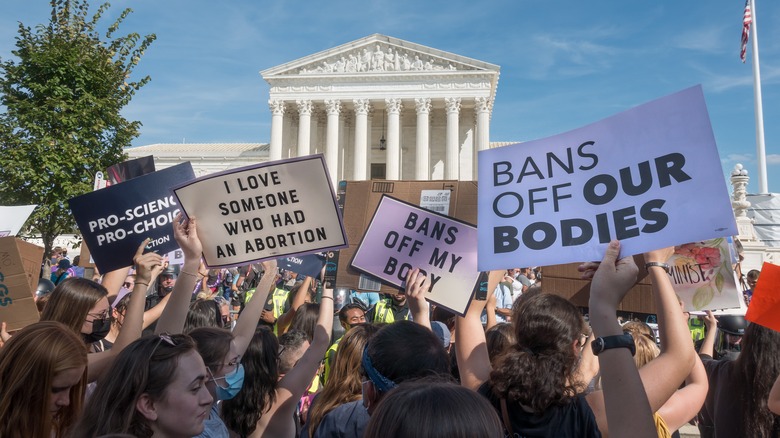O'Neill Institute's Rebecca Reingold On The Long-Term Effects Of Overturning Roe V. Wade - Exclusive Interview
Stepping into the United States now feels like stepping back in time following the Supreme Court's decision to overturn Roe v. Wade. This case, which solidified its spot in history in 1973, is one that many American women have turned to over the years when it comes to their reproductive rights.
However, everything changed on June 24, 2022, when this right was overruled during a new case called Dobbs v. Jackson Women's Health Organization. While in court, it was deemed that the United States Constitution included no right for women to choose to have an abortion. This overruling shook the world, causing mass protests across the country and leaving American women questioning what other rights they would soon lose.
With word that contraceptives and marriage equality could be something the Supreme Court looks into next, Health Digest spoke with a legal expert on the subject — Rebecca Reingold, Associate Director of the Health and Human Rights Initiative based at Georgetown Law — who told us what long-term effects overturning Roe v. Wade could have on all Americans.
How this decision affects Americans
What direct effects will the overturning of Roe v. Wade have on the health and healthcare of American women?
Overturning Roe v. Wade allows states to decide whether to protect, ban, or regulate access to abortion. Abortion rights now depend entirely on the state where a person resides. Many women who are living in poverty, in rural areas, who are women of color, who are young, who are undocumented, and who experience intimate partner violence will find it impossible to access abortion services. Ultimately, women who are already marginalized and underserved will bear the primary burden of this decision, with devastating consequences for their health, well-being, and dignity.
Research has shown that state abortion bans will likely increase pregnancy-related deaths. They will also result in negative physical health outcomes for women who are delayed in accessing abortion services or unable to access them altogether. Delaying abortions beyond the first trimester significantly increases health risks. Women who have difficulty accessing safe, legal abortions may turn to unsafe, clandestine abortions without expert medical oversight.
For some women, pregnancy and childbirth can result in life-altering health problems or even death. State abortion bans will also negatively affect women's mental health and emotional well-being, as they are forced to choose between an unsafe abortion or carrying an unwanted pregnancy to term.
How will this change the way that hospitals and clinics operate?
Abortion clinics in states with abortion bans or even just strict gestational limits — starting at six or eight weeks of pregnancy — are likely to close permanently. Health providers that also provide other services, like hospitals, will stop providing all or nearly all abortion services. Even where there are exceptions for risk to the pregnant woman's health, health professionals may hesitate to provide abortions under those circumstances because they lack clarity about what exactly "lifesaving" means and do not want to risk prosecution. Health professionals may be forced to make agonizing choices between upholding their ethical obligations and following the law.
Clinics and hospitals may also hesitate to treat or stop treating miscarriages or other situations involving inevitable pregnancy loss altogether. Abortion and miscarriage are often clinically indistinguishable. Many women require treatments to avoid miscarriage complications that threaten their health or lives, which can include treatments or procedures used for abortion care. The shrinking number of health providers willing to provide abortion services and treat miscarriages will have far-reaching consequences for maternal health outcomes.
Resources that are still currently available to women across the country
What kinds of resources are available for women in states where abortions are now illegal?
Various resources are available to women in states with abortion bans. Some companies have pledged to cover travel expenses for women seeking abortions. Confidential hotlines are available to support women and others investigated, arrested, or prosecuted for self-managed abortion — a self-managed abortion is when someone ends a pregnancy outside of a clinical setting. Other resources provide information about how to purchase abortion medication online, including from sources outside the U.S.
Unfortunately, abortion funds that have historically provided financial and other forms of support to women seeking out-of-state abortions are still in the process of assessing the legal risks involved in the wake of the Supreme Court's decision in Dobbs v. Jackson Women's Health Organization.
Will a woman residing in a state where abortion is banned be able to access abortion services in other states where it is legal?
In theory, women in states that ban abortion may access abortion services in states where it remains legal. In practice, however, numerous barriers would make interstate access difficult. When it comes to medication abortion, most telehealth abortion services currently operate only in states where abortion is legal, limiting access for women in states where it is not.
Moreover, 19 states already prohibit telehealth prescriptions for abortion medication. Women may also travel to other states for medication or surgical abortions. However, various hardships could prevent many women from traveling long distances, such as taking time off from work, finding childcare, and covering travel costs.
States with abortion bans may also try to prohibit their residents from crossing state lines to access abortion or prosecute health professionals in other states who provide abortion services to their residents, which would curtail interstate abortion access. Missouri recently considered a bill authorizing out-of-state lawsuits against anyone who "aids and abets" a Missouri resident's abortion. At least one state has adopted a law protecting its health professionals from legal actions from other states. Both types of laws raise novel legal questions that will ultimately need to be decided by the courts.
Other healthcare rights that are potentially at risk
Are there any other rights related to healthcare that may also possibly be overturned following the same legal reasoning used in Roe v. Wade?
The Supreme Court could use the same reasoning it relies on in Dobbs to eliminate the right to contraception. Both the right to abortion and the right to contraception are grounded in the same constitutional right, namely the right to privacy. The Court could conceivably argue in another decision that, like the right to abortion, the right to contraception is not "deeply rooted in the Nation's history and traditions," citing past prohibitions of contraception in the U.S.
It is also possible that the Court's attempt to distinguish the right to abortion from other privacy rights, citing the involvement of "potential life," will not hold for the right to contraception. Advocates of restrictions on access to contraception may argue that the right to contraception similarly "destroys a potential life." In fact, Justice Thomas' concurring opinion in Dobbs explicitly calls for the Court to revisit Griswold vs. Connecticut, one of the decisions that established the right to contraception.
Were the Supreme Court to eliminate the right to contraception, contraceptive access would be left to the states, as is now the case in the context of abortion. States would be able to decide whether to ban, restrict or protect access to all forms of contraception. Some states may decide to ban all or certain forms of contraception, like emergency contraception or IUDs, and criminalize health professionals who provide patients with these services. These bans and restrictions would have a disproportionate effect on people who are already marginalized and underserved, making it extremely difficult or even impossible to access contraception.
What can women do to voice their concerns or create changes to these new policies?
Women can influence the future of abortion access, particularly in states with abortion bans, by voting in the upcoming midterm elections and by sharing their stories. On the one hand, they can vote for federal and state lawmakers who commit to protecting, rather than prohibiting, access to abortion services. They can also vote in favor of ballot measures that advance reproductive rights, such as by amending a state's constitution to explicitly include the right to abortion.
On the other hand, women can share what past access to abortion and other essential reproductive health services has meant for them, their families, and their communities. When women share their stories, it normalizes abortion and helps reduce the stigma associated with it.
Learn more about what the Supreme Court's decision to overturn Roe v. Wade means for sexual and reproductive health at the O'Neill Institute's website.
This interview was edited for clarity.




